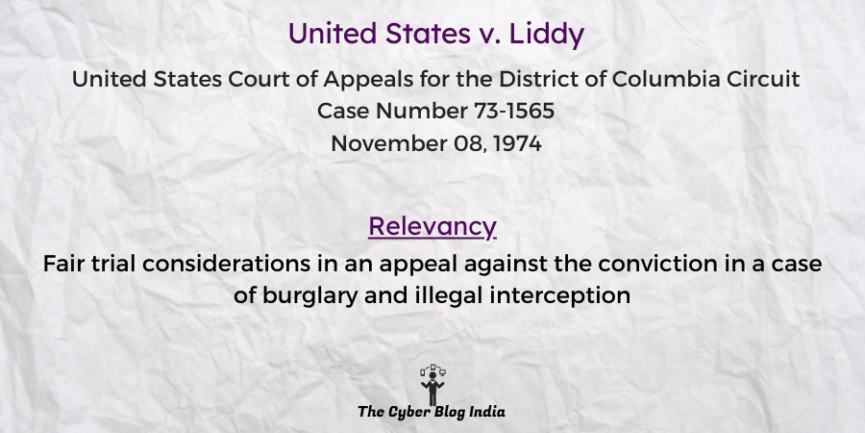United States v. Liddy

United States v. Liddy
509 F.2d 428
In the United States Court of Appeals for the District of Columbia Circuit
Case Number 73-1565
Before Chief Judge Bazelon, Circuit Judge Wright, Circuit Judge McGowan, Circuit Judge Leventhal, Circuit Judge Robinson, Circuit Judge MacKinoon, and Circuit Judge Wilkey
Decided on November 08, 1974
Relevancy of the Case: Fair trial considerations in an appeal against the conviction in a case of burglary and illegal interception
Statutes and Provisions Involved
- The Wiretap Act, 18 U.S.C. § 2511
Relevant Facts of the Case
- The trial court had convicted Liddy on counts relating to burglary and wiretapping of the Democratic National Committee offices in the Watergate apartment-office building complex.
- Liddy’s name was present in six out of eight counts of indictment delivered against seven defendants. Five defendants changed their pleas to guilty shortly after the trial began. However, Liddy and one other defendant did not. Later on, the jury found them guilty.
- He has now approached this court to have his conviction overturned.
Prominent Arguments by the Counsels
- The appellant’s counsel argued that the trial judge faulted in conducting voir dire of witnesses by refusing to question each venireman subjected to pre-trial publicity. Further, the judge made a mistake by reading the evidence of a government witness and holding related bench conferences without the jury’s presence.
- Further, the judge’s instructions wrongly enabled the jury to assess the timing and circumstances surrounding the appellant’s hiring of an attorney. The counsel further submitted that the trial judge’s compliance with an order limiting the entry into evidence of the contents of illegally intercepted conversations limited his ability to cross-examine a government witness.
Opinion of the Bench
- The trial judge’s overall actions did not constitute an abuse of his judicial authority or denial of a fair trial. He only spoke after the jury was about to be excused. The prosecutor had completed his cross-examination, and the defence counsel did not raise any questions.
Final Decision
- The court found no reversible error and affirmed the appellant’s conviction.
